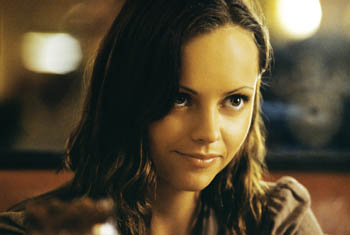![[Metroactive Movies]](/movies/gifs/movies468.gif)
[ Movies Index | Show Times | Santa Cruz Week | SantaCruz Home | Archives ]
Allen Wrench: Christina Ricci is one more of Woody's difficult women characters, in 'Anything Else.'
Nothing Else
Woody Allen's comic instincts are petrified in romantic comedy 'Anything Else'
By Richard von Busack
Maybe like birthdays, Woody Allen isn't counting films any more. I count 33, and I'd count Anything Else as one of his most negligible. The hard-to-advertise title ("See Anything Else!" might not sell tickets) has an illustration of Jason Biggs carrying Christina Ricci inside a cartoon heart on his back. The truth is that Biggs and Ricci are here carrying Allen on their backs. Allen's core audience has to read the fine print in the ads to realize this picture is one of his.
The film is, essentially, a four-person tale of New York. Biggs plays Jerry Falk, a young comedy writer who harbors dreams of being another Sartre or Dostoyevsky. Are there existentialists any more? (This is where Allen goes wrong right away--young writers today dream of being Dave Eggers.) In direct-to-the camera speeches, Jerry describes his relationship with Amanda (Christina Ricci). This temperamental actress has given up sleeping with him; she cheats, pops pills and invites her noisy, troubled mother (Stockard Channing) to move in.
Faced with this situation, Falk does nothing. He's further walled in by an inert psychiatrist and a manager (Danny DeVito, the funniest person in the picture) who is in the wrong line of work. In his own limited way, David Dobel (Allen) is the piece's fairy godfather--an experienced comedy writer with a day job, who has to explain to the young kid that he's being used by everyone around him.
Allen can still deliver a punch line. The old reflexes don't always fail him, even when you can see where a joke's going. He was even funny in his last movie, the much-maligned Hollywood Ending; directing himself is no problem. But when his work is weak, it looks distressingly like the writing of his old associate Neil Simon. Characters stand, fixed, as if in front of TV cameras, and bellow at each other. Then the casus-bellowing is restated ("You want me to leave. I can't believe it! She wants me to leave!") until the scene ends.
Anything Else has a hurly-burly sequence: a piano that needs moving, a valuable yet slippery vase, a yelling mother, Amanda bumping in, asking solicitously--why?--if this stranger in her house wants a sandwich. It's meant to be comedy; it's too hectic and unfocused to be drama. But it's an unpretty, unfunny hubbub, with the camera grinding away.
When using the old showbiz tactic of linking an aging comedian with a pair of young lovers, there needs to be something in the young love that can appeal to the young viewers' tenderer emotions. But the Amanda/Jerry relationship is a grudge match: Biggs as a puppy, Ricci as a bitch.
Oddly, Allen wraps this troubled affair in romantic music. Ricci splays her body out sideways on chairs, though it's her Mona Lisa face you wish Allen was studying, not her legs. And Amanda's blunt way of expressing herself doesn't demonstrate what, exactly, she has that charms people.
No one could fault Allen for thinking of ways to reach younger people; such hustling is the nature of the movie business. But in casting himself as a mentor to Biggs, as a fountain of advice and terrible jokes, he should have realized that it is the nature of younger people not to want to be advised or lectured. Or to be told bad old Henny Youngman jokes, as Dobel does.
Biggs--a Dustin Hoffman without the rebellion--is incapable of striking any sparks back; there's no give and take. It's an old trick of Allen's to turn his leads into surrogates for himself, but laminating his same tastes for old music and existential books onto Jerry and Amanda makes Anything Else seem all the more like everything else Allen's done. It's strange how fresh a Moby song sounds here emerging from Allen's usual soundtrack of moldy-fig jazz.
I'm not saying Allen's time is past. The all-ages mourning for Johnny Cash is proof that artists don't have to appeal to only one generation. What I am saying is that Allen's antenna for new subjects seems to be down.
Dobel is a slightly different Allen character. He's more volatile, violently paranoid and into guns. Many of Allen's past characters were haunted by the Holocaust. Though Dobel's no Zionist, he's convinced that a new Holocaust could break out any minute and urges Jerry to get a rifle. Could this otherwise slight subplot be Allen's implicit reaction to Sept. 11? If he feels this way, why doesn't he speak up about it? The old Allen used to lampoon the right-wing. Why is he mute now? There are good new books and movies. Why aren't these reference points a source for a new generation of Allen jokes?
Though there's a beautifully composed shot of an Art Nouveau bridge in Central Park, I'm not even sure New York is a surefire inspiration for Allen anymore. In one scene where Biggs goes out for a walk to feel better, he talks about how New York always makes him feel better, and the shot we see is something vague--it seems like a slice of the dark Hudson River seen through a chain-link fence, but it is so murky the image doesn't even really register.
Copyright © Metro Publishing Inc. Maintained by Boulevards New Media.
For more information about Santa Cruz, visit santacruz.com.
![]()

Photograph by Brian Hamill
Anything Else (R; 108 min.), directed and written by Woody Allen, photographed by Darius Khondji and starring Jason Biggs and Christina Ricci, plays countywide.
From the September 24-October 1, 2003 issue of Metro Santa Cruz.